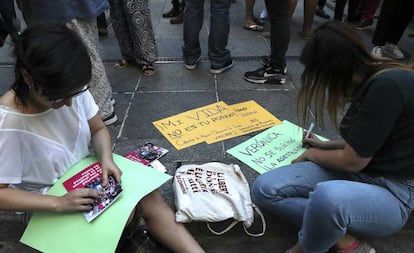“I can’t take it anymore”: How revenge porn pushed a Spanish woman to suicide
Co-workers recall what victim Verónica went through at the auto factory where she worked before deciding to take her own life

“It makes me sick to think what a person must be going through to decide they no longer want to go on living,” says a worker at the Madrid factory of Iveco, the Italian commercial vehicle manufacturer. “Was there nobody to tell her that it would be all right, to take the sting out of the situation? Was she really that alone?” he wonders.
He is talking about Verónica, a 32-year-old factory employee and mother of two young children, who killed herself on May 25 inside her home in Alcalá de Henares, in the northeast of the Madrid region. She had been under pressure for more than a month after colleagues began sharing intimate videos of her. At first, a group of around 20 had access to the images. This later ballooned to more than 200. The company employs around 2,500 people at its Madrid factory.
Was there nobody to tell her that it would be all right?
Co-worker of the victim
Investigators are still trying to determine who sent the material out in the first place, although the prime suspect is a former boyfriend. The videos were made five years ago, before Verónica got married. It wasn’t even the first time it happened. Those same files “made the rounds” a few years ago, but Verónica managed to put a stop to it then, said three co-workers.
But this time, she couldn’t stop it. For 10 days, the factory corridors echoed with laughter and people came up to Verónica to check for themselves that she was the woman in the videos.
“I think that nobody really realized the gravity of what was happening, it was viewed as a joke,” says one worker. But for Verónica, it was a period of unrelenting humiliation and anguish. One employee remembers hearing her saying out loud on one occasion: “I can’t take it anymore.”

Things got worse. Her sister-in-law found out, then her own husband, with whom she reportedly had an argument the day before her death.
On May 23, at a meeting with the heads of human resources, Verónica explained the situation and provided a name. The reply was that this was a personal matter, according to a lawyer who works for the labor union CC OO. Soon after, she was offered a transfer to a different section or a period of sick leave. The union says this was not enough, and that they went to see her on Friday with a formal complaint to file before the company, but she had already gone home. On Saturday she was dead.
Probes
Police and prosecutors are investigating the case, and a court in Alcalá de Henares has launched its own probe after the victim’s father took legal action. Meanwhile, the Spanish Data Protection Agency is investigating whether there was a breach of privacy laws. And CC OO said it would take the matter up with work inspection over a violation of gender equality legislation and of occupational hazard prevention laws.
An ex-boyfriend of Verónica’s who had been targeted by the police walked into a Civil Guard station in Mejorada del Campo on Thursday to provide testimony, but he denied being the person who sent out the sensitive material. He was let go, and a judge is assessing whether to summon him to a hearing.
I think that nobody really realized the gravity of what was happening
One of Verónica’s co-workers at Iveco
But the man whose name Verónica mentioned to human resources was someone else. It was someone who worked with her at Iveco. On Friday, a company memo said that Iveco would be launching an internal investigation with “someone from the outside” and asked for cooperation.
Since the Monday after the suicide, a group of employees has been congregating outside the front door to show their dismay, and to ask that people refrain from “criminalizing” the entire staff. “We are not all guilty and we are not all accomplices,” wrote a group of 20 workers, mostly male, in a note sent to news agencies.
Feminist groups in Madrid staged protests at Plaza de los Cubos, with signs reading “accomplices.” Asked who these accomplices are, the reply by one protester was: “Whoever sent it, whoever shared it, whoever saw it and did nothing, and whoever knew about it and also did nothing.”
English version by Susana Urra
Tu suscripción se está usando en otro dispositivo
¿Quieres añadir otro usuario a tu suscripción?
Si continúas leyendo en este dispositivo, no se podrá leer en el otro.
FlechaTu suscripción se está usando en otro dispositivo y solo puedes acceder a EL PAÍS desde un dispositivo a la vez.
Si quieres compartir tu cuenta, cambia tu suscripción a la modalidad Premium, así podrás añadir otro usuario. Cada uno accederá con su propia cuenta de email, lo que os permitirá personalizar vuestra experiencia en EL PAÍS.
¿Tienes una suscripción de empresa? Accede aquí para contratar más cuentas.
En el caso de no saber quién está usando tu cuenta, te recomendamos cambiar tu contraseña aquí.
Si decides continuar compartiendo tu cuenta, este mensaje se mostrará en tu dispositivo y en el de la otra persona que está usando tu cuenta de forma indefinida, afectando a tu experiencia de lectura. Puedes consultar aquí los términos y condiciones de la suscripción digital.









































